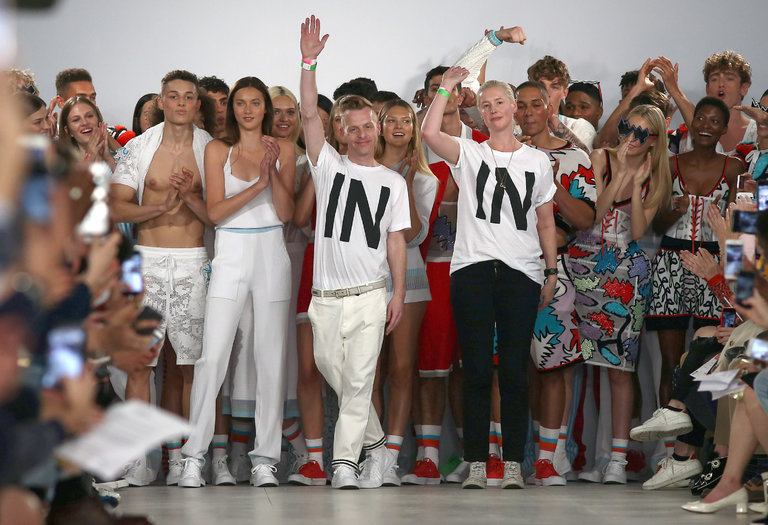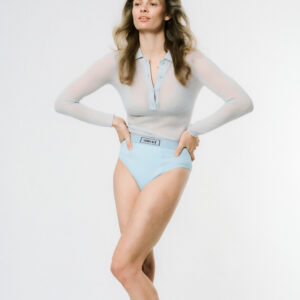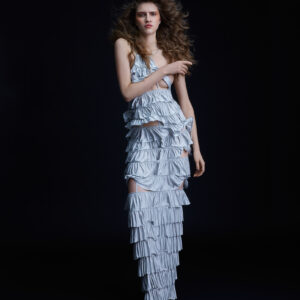
Sid Bryan and Cozette McCreery of Sibling show their opposition to Brexit after their show in London in 2016
Eighteen months ago on the night of the last General Election, I was convinced Labour would win. When the exit polls came out, I kicked the sofa, burst into tears, and realised pretty quickly that I was living in an echo chamber.
What I took to be the consensus, was in fact the world order of the international fashion industry: more used to grabbing a Eurostar to Paris, than travelling to Wigan, more used to the freelance hustle from job to job, country to country. Someone recently told me I am a member of the elite, but having survived on the varying freelance wages of famine and feast for over 20 years, this doesn’t so much feel like the elite when I understand that a difference in 5% profit margins, means the difference between being in debt, or being able to continue. As a fashion stylist, I have been up against some of the best styling competition around the world. So far, jumping on a plane or a train to do a job, making the money and keeping my finances afloat, has been very simple. It’s competitive enough, without adding into the mix that post Brexit, my UK passport might stop me accessing EU work only an hour away: working in Paris and Milan being a huge factor in any stylist’s business, earnings and profile.
The day after the General Election, someone suggested I apply for the Fabian Women’s Network mentoring scheme. I knew vaguely who the Fabians were, based on a National Trust Sunday afternoon visit to George Bernard Shaw’s house, who set up the society over 100 years ago. Although I was more familiar with ‘Androcles and the Lion’ than political meetings I applied, was accepted onto the course and Sharon Hodgson MP became my mentor.
No-one quite grasps how daunting Westminster is until you get there. The Gothic Revivalist architecture, the scale of Westminster Hall with its original Norman vaunted wooden roof. The warrens of corridors with gaudy gothic wallpaper, paintings which wouldn’t cut it on the walls of the National Portrait Gallery and guards in 18th Century costume are all overwhelming.
I went to every meeting I could, went from being scared to raise my hand, to asking questions; and last August Sharon offered me a job, which I now combine with my styling career.
My key work for her has been on arts education and in combination with that, I attend every Parliamentary Brexit meeting I can, to learn more about what the Government’s plans are, as it seems less about Right or Left and more about what Brexit will do to those who like me have worked hard to build a business entrenched in EU free trade deals, Europe-wide employment and international shows.
Last month Hilary Benn spoke at such a meeting in Portcullis House with Tim Shipman Political Editor at the Sunday Times and it was here that I really started to feel concerned that the creative industries were not lobbying on Brexit’s terms and trade issues coherently.
Apart from being the only person in the room who sees a pair of Acne silver Pistol boots as corporate clothing, I heard question after question from man after man, a sea of suits from unions to financial services and realised that if I didn’t ask what would happen if we do leave the customs union – leaving the single market will be devastating to the fashion industry – no one else would. Hilary Benn is Chair of the Brexit Select Committee. He is a very smart man and he shares the concerns of many about the impact on UK trade and business. But with all the goodwill in the world, I realised that he wasn’t aware of the impact on fashion, an industry which makes £25 Billion per annum, with a 6% annual growth for the UK, our largest growth market, and so I decided that he and cross-party Parliamentarians needed to hear more about our concerns.
Apart from being the only person in the room who sees a pair of Acne silver pistol boots as corporate clothing, I heard question after question from man after man, a sea of suits from unions to financial services and realised that if I didn’t ask what would happen if we do leave the customs union, no one else would
I arranged a round-table for and invited key figures from the fashion industry to come to Westminster and explain what EU trade means to their business and why they are so concerned by the rhetoric of Brexit. Hilary Benn attended, as did Culture Minister Matt Hancock, Kevin Brennan, Shadow Culture Minister, Karin Smyth Private Parliamentary Secretary to Keir Starmer, Shadow Minister for Exiting the EU, Baroness Young of Hornsey, Sharon Hodgson and all their advisors, including Damian Collins who chairs the DCMS Select Committee, along with Tom Watson’s advisor.
Paul Hunt, Head of events and casting at JN Production, explained the issue of visa entries for models; as the ‘mother agency’ for any new talent, a modelling agency generates 10% on the future worldwide earnings of any model on its books. Martyn Roberts, Head of Graduate Fashion Week and Fashion Scout, explained how restrictions on visas and increasing tariffs are already impacting on fledgling designers choosing the UK to study, while China is building its arts education market up. Caroline Rush from the British Fashion Council outlined their lobbying for continued growth.
Frieda Gormley CEO of House of Hackney, which produces 75% in the UK, spelled out the huge worry of narrowing margins of £ to €/$ exchange rates, combined with uncertainty on trade deals; while independent jewellery designer and retailer Vicki Sarge discussed the tight margins needed to keep afloat. Photographer Nick Knight expressed his concerns very clearly about how challenging it is to prove the talent of a young, untested creative, in the face of tight visa restrictions.
The creative sector is worth £87 billion per annum, our needs have to be a part of the conversation. If Brexit has taught us anything positive, it’s that we all need to reach out and engage, to highlight successes and support each other.


